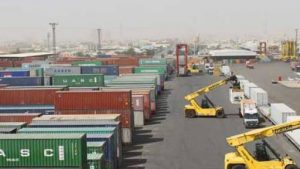Baring any unforeseen circumstances, the recently inaugurated Kaduna Inland Dry Port promoted by Inland Container Nigeria Limited (ICNL) will commence international operations by welcoming dry and refrigerated cargoes from various ports across the globe.
The facility, which is expected to generate 1,500 direct and 5,000 indirect jobs, will also handle export goods directing from its base.
The Executive Secretary, Nigerian Shippers Council (NSC), Hassan Bello, disclosed this in an exclusive interview with Daily Sun in Abuja yesterday.
According to him, the Kaduna Dry Port targets 24-hour operations and 48-hour cargo clearance.
He assured that the government will support the development of seaports and dry port, even as he urged playere to adhere to international best practices. He said: “The kaduna dry port has commenced operations and if course we know it used to operate as a Customs bonded warehouse.
“But we must make sure it perfoms well and operates successfully. But the government will not tolerate any form of laxity from the operator. We must make sure that transparency and efficiency are deeply entrenched. The dry port also empties into the ease of doing business initiative of the government.
“All the negotiated charges will be published for the public to ensure certainty and predictability. We want to ensure all the hitches experienced at our seaports are not seen at the dry ports”, he said.
The NSC boss said the Council has been organizing meetings with all government agencies to ensure the kaduna dry port attains full-blown operations. “We’ve been having meetings with the Nigerian Railway Corporation (NRC), the Customs, the Nigerian Ports Authority (NPA) and other stakeholders to come and support this dry port. We need synergy to ensure challenges experienced at the seaports, especially in the area of traffic management.
“We commend the Kaduna State Government for its support and commitment towards this project”, Bello added. He revealed that the Kaduna dry port has a three-phase developmental blueprint. “The first phase is where we are right now which comprises the warehouse for import and export, rail line into the dry port, presence of Customs and other agencies.
“Stacking area, consolidation centres for exports and all that are for the second phase. We’re working with NEXIM Bank to look at dry ports as centres for export.
“The third phase is expanding the capacity from the current 5,000 TEUs, to about 25,000 TEUs. It also entails moving to the permanent site of the Kaduna dry port and integrate this place with the permanent site”, he said.
On other the status of other dry ports projects across the country, Bello said the Jos project was 70 per cent completed adding that works on the dry port in Funtua, Katsina State was in full blast.




